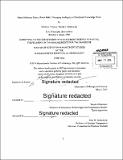What difference does a robot make? managing ambiguity in distributed knowledge work
Author(s)
Beane, Matthew I. (Matthew Ian); Orlikowski, Wanda J
DownloadFull printable version (2.666Mb)
Alternative title
Managing ambiguity in distributed knowledge work
Other Contributors
Sloan School of Management.
Advisor
Wanda Orlikowski.
Terms of use
Metadata
Show full item recordAbstract
What difference does robotic telepresence make to the management of ambiguity in distributed knowledge work? We examined this question in a post-surgical intensive care where remote medical workers struggled to coordinate their work in the face of ambiguities related to their extremely sick patients. Our in-depth field study allowed us to explore how differently ambiguity was managed when night rounds were performed through robotic telepresence, allowing distributed medical workers to be virtually co-present at the site of work. In contrast to the literature, which suggests that co-located, face-to-face interaction should reduce ambiguity and facilitate coordination, we found that ambiguities were both reduced and intensified with robotic telepresence, resulting in contradictory implications for coordination. We found that these differences in the management of ambiguity and coordination were crucially related to how the distributed work and commitment to that work were materially enacted in practice. After discussing our findings, we explore their significance and contributions to research on the management of ambiguity in distributed knowledge work.
Description
Thesis: S.M. in Management Research, Massachusetts Institute of Technology, Sloan School of Management, 2014. Cataloged from PDF version of thesis. Includes bibliographical references (pages 30-32).
Date issued
2014Department
Sloan School of ManagementPublisher
Massachusetts Institute of Technology
Keywords
Sloan School of Management.